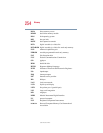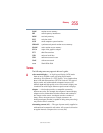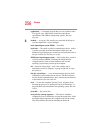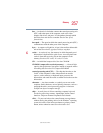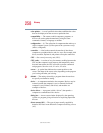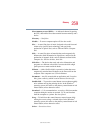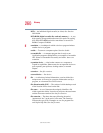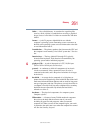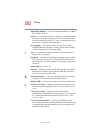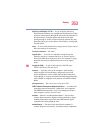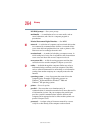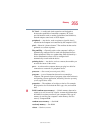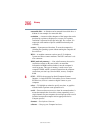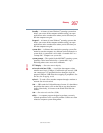
262
Glossary
5.375 x 8.375 ver 2.4.0
high-density diskette — A 3.5-inch diskette that holds 1.44 MB of
data. See also diskette.
hot key — (1) A feature in which certain keys in combination with
the
Fn key can set system options or control system parameters,
such as the battery save mode. (2) A key or combination of keys
that activates a memory resident program.
hot swapping — The ability to add or remove devices from a
computer while the computer is running and have the operating
system automatically recognize the change.
I
icon — A small image displayed on the screen that represents a
function, file, or program.
interlaced — A method of refreshing a computer screen, in which
only every other line of pixels is refreshed. Interlaced monitors
take two passes to create a complete screen image. Compare non-
interlaced.
internal device — See device.
Internet — The decentralized, world-wide network of computers
that provides electronic mail, the World Wide Web, and other
services. See also World Wide Web.
K
keyboard shortcut — A key or combination of keys that you use
to perform a task instead of using a pointing device.
kilobyte (KB) — A unit of data equal to 1024 bytes. See also byte.
L
L1 (level one) cache — Memory cache built into the processor to
help improve processing speed. See also cache, CPU cache, L2
cache.
L2 (level two) cache — Memory cache installed on the
motherboard to help improve processing speed. It is slower than
L1 cache and faster than main memory. See also cache, CPU
cache, L1 cache.
LAN (local area network) — A group of computers or other
devices dispersed over a relatively limited area and connected by
a communications link that enables any device to interact with
any other on the network.



